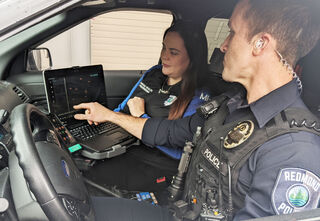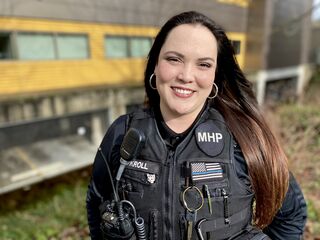Health
Mental Health and Community Policing
A new model to address systemic racism with law enforcement.
Posted June 23, 2020 Reviewed by Abigail Fagan

Redmond, Washington is a city that covers 15 square miles with a population of 65,000. The number swells to more than twice that during the day as Microsoft and Nintendo are both headquartered there. The city is approximately 30 minutes east of downtown Seattle.
Since 2017, the city has utilized what's known as a co-responder model to emergency calls where a mental health professional (MHP) responds to those calls alongside an officer.
For now, the city has one licensed mental health therapist on-board, Susie Kroll. Kroll has an extensive background in community mental health and also teaches crisis intervention and de-escalation at the Washington State Police Academy. "There's a significant recognition this is a necessary part of a really solid part of community policing and community service." Part of the funding for Kroll's position comes from a $50,000 state grant through the Washington Association of Sheriff’s and Police Chiefs (WASPC) where she works not only with Redmond Police but with the law enforcement agencies in Bothell, Shoreline, Kenmore, Kirkland, and Lake Forest Park.
Due to the effectiveness of this program, the Redmond Police department has decided to allocate funding to hire this position as a full-time employee by August of this year; Kroll is looking to compete for the position to help continue the work she has done and improve the program further.
Captain Ron Harding has been with the Redmond Police Department for more than 25 years and sees police as an extension of social work but also recognizes the limits to law enforcement. "For us, it was just kind of a next step to include a mental health professional to help us mitigate what is reported to us as criminal activity but the root cause is a mental health condition. It doesn't do any good to put those people in jail for things that are stemming from mental health processes."

Harding sees the co-responder model an innovative and creative approach to addressing the myriad of calls related to mental health, substance abuse, domestic violence, and petty thefts like shoplifting which make up the bulk of their disturbance calls.
While Kroll looks like an officer with a similar-colored uniform along with a bullet-proof vest, she is not armed nor is she asked to go in first into a potentially risky situation. Harding says safety remains the utmost priority, "The parameters that we've set up is that she never goes into a situation until an officer has been there and made it safe."
With the Black Lives Movement protests occurring throughout the country demanding more police accountability, transparency, and re-allocating of resources towards rehabilitation, Kroll views the co-responder model as the best model for other law enforcement agencies to adopt. "So when you ask me if this is a viable option for the argument for defunding, refunding, reorganizing or disbanding, any of those options that people are talking about right now my answer will always be 100% of the time, the police departments need to have mental health professionals on staff and MHP need to respond with police to these calls."
In King County (of which Seattle and Redmond are a part of), mobile crisis teams made up of mental health professionals respond to incidents to offer referrals and other resources in certain situations. But mental health professionals do not respond until police have deemed the incident safe. Safety is a key reason why Kroll believes it's erroneous to think we can do away with police in these types of calls. "The reason why I will always say a co-responder model is necessary is because there are layers of crisis and I think that is getting lost in the larger discussion about what's happening with our society, social-serviced involved individuals in crisis who need support. The way you deal with a domestic violence crisis with a weapon present is very different from a domestic violence crisis where a woman or a man is in a situation where they're not having an immediate emergency but their living situation is a crisis and they need some guidance."
One of the most gratifying incidents Kroll recalls was from a suicide attempt from a man who overdosed on heroin and she was able to bring him back to life from her counseling training in the use of Narcan (a nasal spray used to treat opioid overdoses). Kroll describes what occurred, "My partner kicked the door in and we found him blue and not breathing, unconscious...I carried Narcan from my training as a counselor and a minute later he became awake. We saved his life and that’s one of the best examples of this model because if it was my partner showed without me he would’ve possibly died and if it was just me, I would’ve broken the law (i.e. entering a residence without permission)."
While incidents of people dying from police shootings continue to stir national debate on what types of reforms should occur, Kroll is adamant this symbiotic relationship between mental health and law enforcement is not only viable but one that can mitigate and minimize the use of deadly force. "Since 2017, I’ve responded to hundreds of crisis calls, domestic violence incidents, really serious situations, shoplifters with weapons, suicidal callers with guns or knives, and all the times that I’ve been there with police doing their work and me doing my intervention…I haven’t had anyone die from the lethal use of force and I believe it’s 100% because of the partnership.”


